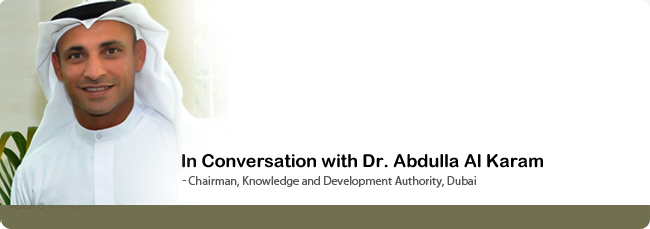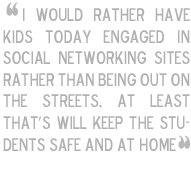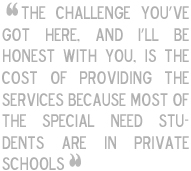In Conversation with Dr. Abdulla Al Karam

Aakanksha Tangri/Mumbai Jul. 26, 2011
Abdulla Al Karam: One thing you have to notice is, for us to really make progress in education we ought to tackle the issues differently and we have to come up with more innovative and creative ideas. It has been a good 3 years of progress from KHDA. It has been steady, some of the results we see and the outcomes from the inspections are starting to come but I think this is really fundamentally changing the way we are trying to improve and reform education. If I take whatever KHDA has done in 3 years and compare to it similar organizations in the world, you will find the fundamental difference. When you go to any education system, whether secondary or state level, you will always see that improvement in education takes an engineering approach as in you try to do teacher training, try to change books and curriculum, try to do IT, try to do “rolling the sleeves” and fix it as an education body. In KHDA, we decided that this wouldn’t be our approach because if you look at the statistics, we have a different landscape. We have 86 per cent of students in private schooling and 14 per cent in public and you cannot compare it elsewhere in the world. Even that 14 per cent in public schools are managed by the federal and not by us. Basically, the engineering approach is not viable as a methodology to improve education. What seems to be more reasonable for us to do is trying to have the system itself, most of it privately managed or owned and installing accountability majors. It might take us longer to see some of the results but it is definitely going to be happening at a larger scale vis-à-vis the schools itself, but not you as education body. The most important part of this, if and when, it happens from the bottom up, it is definitely going to be sustainable. Education bodies do change and people do change but the schools are here to stay. This is fundamentally what we’re trying to do, you have to look at the steps we’ve taken in the past 3 years and what was the output of it has been. It cannot be huge steps because we’re dealing with a large system and we don’t expect overnight results but as long as it’s gradual and we’re moving in the same direction, it is a steady progress.
AT: With children becoming increasingly addicted to social networking sites such as Facebook, which affects their productivity and grades, what is your advice for students?

Al Karam: I’m a technology by major and through previous work I’ve done. Technology is good for us but there’s a flip side. It is here to make our life easier whether it was the TV, then the computers and laptops, and now the smart phones. Technology will always change but as long as parents and students are engaged with it positively, it is a good thing to have. There will always be a side effect but you have to look at the positive side of the change. I would rather have kids today engaged in social networking sites rather than being out on the streets, at least that will keep the students safe and at home. If you look at it today, if the students who want to go the distance or learn more, you don’t have to go to the lab, you get the information with the click of a button. It’s a good thing to have with due parental diligence. You cannot take it away and I don’t think you can anyway!
 Al Karam: The vast majority of the students in the system are regular but then you have the challenged and the gifted. The last two make up around 20 or 30 per cent of the system, but if you really engage them into the system, it will be much better than leaving them out of the system. We don’t want to have to say there is a system for the regular students and the challenged. The challenge you’ve got here and I’ll be honest with you is the cost of providing the services because most of the special need students are in private schools, but there are a lot of positive signs from certain schools that are taking action. When we go to inspect schools, we make sure all the student’s needs are addressed. We’re trying to deal with it and integrate it further within the system.
Al Karam: The vast majority of the students in the system are regular but then you have the challenged and the gifted. The last two make up around 20 or 30 per cent of the system, but if you really engage them into the system, it will be much better than leaving them out of the system. We don’t want to have to say there is a system for the regular students and the challenged. The challenge you’ve got here and I’ll be honest with you is the cost of providing the services because most of the special need students are in private schools, but there are a lot of positive signs from certain schools that are taking action. When we go to inspect schools, we make sure all the student’s needs are addressed. We’re trying to deal with it and integrate it further within the system.
AT: In your opinion, what skill should students acquire to be leaders in the 21st century?
Al Karam: They have to be innovative — there is no question about it. The 21st century comes with challenges we’ve never seen before. You cannot rely on traditional methodology because you have got to be innovative. Innovation is the future. And what are we doing in our schools to encourage innovation? I always say if you keep doing what you’ve always been doing, you always will get what you’ve always been getting. This won’t be good enough in the 21st century. We have challenges today that haven’t been seen before such as global warming so you cannot rely on what’s been done before.
AT: Where do you see the Dubai education sector in the future?
Al Karam: When people talk about Dubai, they talk about shopping, tourists, hotels, restaurants, and entertainment. In the future, people will talk about Dubai in terms of quality of living and basically quality of education and not simply about the buildings and all. You have all of the above but you have a really good education system, accessible to all. This is really what we look forward to.